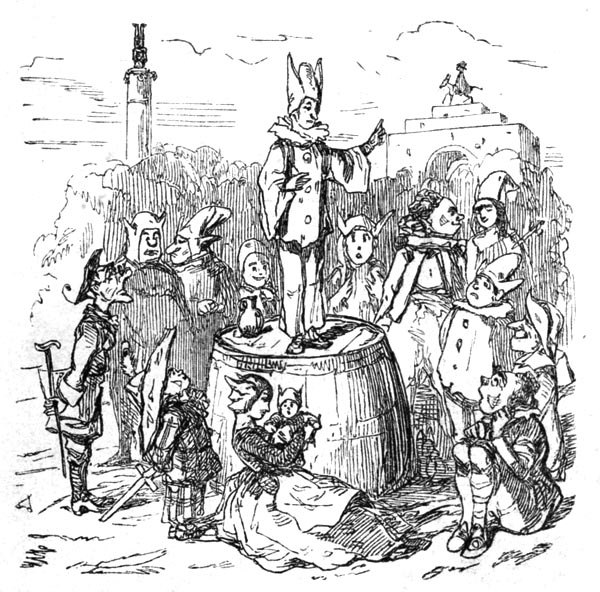 |
| From the title page of Vanity Fair (Wikipedia) |
Note: Becky Sharp was a gold digger, a social climber, a designing woman--and somehow managed to remain sympathetic!
Get Ready: Do we judge ambitious women by a different standard than the one we use for ambitious men?
In 1678, an English Christian named John Bunyan wrote a heavy-handed allegory called The Pilgrim's Progress. It features characters with names like "Mr. Worldly Wiseman" and "Pliable," in addition to the book's protagonist, the transparently named "Christian." Places, too, have revealing names: "The Slough of Despond" and "The King's Highway."
But none seems to have influenced popular culture like the place where the devil Beelzebub makes every temptation available to humans--for a price--the aptly named "Vanity Fair." Today it's the name of a well-known magazine, but in 1848 it was a novel, by the English author William Makepeace Thackeray.
The novel is typical of its time: many characters, plots and sublots, and lots and lots of words. It will take us two articles to cover it all, but it's an excellent way to get familiar with the style of 19th-century English novels.
The novel has two main characters. One is Amelia ("Emmy") Sedley, a good-natured, simple-minded girl--with a wealthy dad. But it is her friend, the willful, scheming gold digger Rebecca ("Becky") Sharp who steals the show.
Becky is born in humble circumstances, but is attracted to the finer things in life. She first attaches herself to her school chum Emmy, and uses that girl's position in society to improve her own. Men are especial targets for her, including Emmy's fiancé, Captain George Osborne, and her bumbling (but rich!) brother Joseph, called "Jos." After making a play for George, and failing, Becky sets out on her own.
She goes to work as a governess to the daughters of a minor nobleman, Sir Pitt Crawley. She secretly marries Sir Pitt's second son, Rawdon, but the move backfires: When Sir Pitt's wife dies, he proposes to Becky, who had not expected the poor woman to die so soon. Of course, being already married, she must turn down Sir Pitt's offer. Meanwhile, Sir Pitt's very rich spinster half-sister controls the family fortune, and while she once might have left her wealth to Rawdon, she changes her mind, because she hates Becky. The money instead goes to Rawdon's older brother, also named Pitt.
Meanwhile, Napoleon has escaped from his exile on Elba, and the wobbles produced in the stock market by that unexpected turn leave Emmy's father bankrupt. George Osborne's father forbids him to marry the now-broke Emmy, but at the urging of his friend William Dobbin, he does so anyway, and is disinherited.
We'll finish the story in Lesson #08-127.
--------
Read more: https://en.wikipedia.org/wiki/Vanity_Fair_(novel)
Practice: Match the term to its definition below:
- allegory
- backfires
- bankrupt
- chum
- disinherited
- gold digger
- heavy-handed
- scheming
- spinster
- willful
- financially ruined
- works in reverse
- a pal; a friend
- planning, usually in an evil way
- removed from someone's will
- stubborn
- a story in which each part is a symbol of something
- a (usually) woman who tries to get a man's money
- not subtle; clumsy
- an older, unmarried woman
Answers are in the first comment below.
Submitted to the Shenzhen Daily for August 24, 2021


Answers to the Practice: 1. g; 2. b; 3. a; 4. c; 5. e; 6. h; 7. i; 8. d; 9. j; 10. f
ReplyDelete